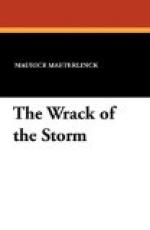“You may save your tears! It is not my fault!”
A peasant who was being hotly pursued sprang into a boat moored to the stone bridge and pushed across the pond with his wife and children. The soldiers, not daring to venture on the ice, strode angrily through the reeds. They climbed into the willows on the bank, trying to reach them with their spears; and, when they failed, continued for a long time to threaten the family, where they all sat cowering in the middle of the water.
Meanwhile, the orchard was still full of people, for it was there that most of the children were slain, in front of the man with the white beard who directed the massacre. The little boys and girls who were big enough to walk alone also collected there and, munching their bread-and-butter, stood looking on curiously to see the others die or gathered round the village idiot, who lay upon the grass playing a whistle.
Then suddenly a movement ran through the length of the village. The peasants were turning their steps toward the castle, standing on a high mound of yellow earth at the end of the street. They had caught sight of the lord of the village leaning on the battlements of his tower, watching the massacre. And the men, women and old folk stretched out their arms to him where he sat in his cloak of purple velvet and cap of gold and entreated him as though he were a king in heaven. But he threw up his arms and shrugged his shoulders, to show his helplessness; and, when they implored him in ever-increasing anguish and knelt bareheaded in the snow, uttering loud cries, he turned back slowly into the tower; and in the hearts of the peasants all hope died.
When all the children were killed, the tired soldiers wiped their swords on the grass and supped under the pear-trees. Then the foot-soldiers mounted behind the others and they all rode out of Nazareth together, by the stone bridge, as they had come.
The setting sun lit the forest with a red light and painted the village a new colour. Weary with running and entreating, the priest had sat down in the snow in front of the church; and his servant-maid stood near him, looking around. They saw the street and the orchard filled with peasants in their holiday attire, moving about the market-place and along the houses. Outside the doors, families, with their dead children on their knees, whispered in amazement and horror of the fate wherewith they had been assailed. Others were still mourning the child where it had fallen, near a cask, under a barrow or at a puddle’s edge, or were carrying it away in silence. Several were already washing the benches, chairs, tables and shirts all smirched with blood and picking up the cradles that had been flung into the street. But nearly all the mothers were kneeling on the grass under the trees, before the dead bodies, which they knew by their woollen frocks. Those who had no children were roaming about the market-place, stopping to gaze at the afflicted groups. The men who had done weeping took the dogs and started in pursuit of their strayed beasts, or mended their broken windows or gaping roofs, while the village grew hushed and still beneath the light of the moon as it rose slowly in the sky.




